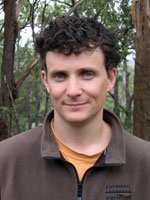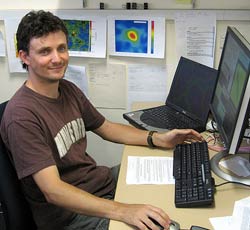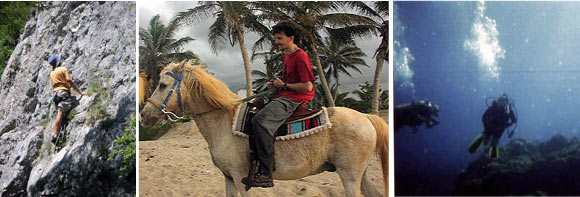Dr Erik Muller - Astronomer

Tell us about yourself.
I was born in Cooma near the Snowy Mountains. From there we moved around a bit: We lived in Townsville for a few years before moving back south to some different places within Canberra. I moved onto Wollongong a few years later, and now I live in Sydney, 25 years after my first steps into kindergarten.
Where did you go to school and how did you get into astronomy?
I went to Canberra High School, which is where I really started getting into science. I continued at Hawker College, where I also did a few Astronomy courses. Although I opted for a general Bachelor of Science at Australian National University in Canberra, I soon decided that I needed to specialise and took up an offer to do a Bachelor of Medical Physics at the University of Wollongong (UoW). Although this was fascinating, it involved a lot of time in hospitals! It didn't take me long to decide that I wanted to do pure research in Astronomy, and I pursued a PhD at UoW and ATNF at the first opportunity.
What has been your career path so far?
I've had a few jobs to do with astronomy: These included operating as a 'duty astronomer' at the Mopra telescope, where I was expected to provide support to national and international scientists who were using the telescope to conduct their observations. I spent 18 months in a postdoctoral position at the Arecibo Telescope in Puerto Rico. I now work as a Bolton Postdoctoral Fellow with CSIRO's Australia Telescope National Facility.
What does a typical work day involve?
My current daily diary includes a fair bit of software development, which is crucial in helping me analyse some data which I've obtained from different telescopes around the world. I need to interpret the results, and develop a consistent and plausible hypothesis, which I can document in a carefully-written report. Ultimately, I submit the report to one of a number of dedicated journals, where colleagues and other researchers can access and study. For this week, I'm making observations with the worlds largest radio telescope, in Puerto Rico. I can operate the telescope, located on the other side of the planet, from my desktop computer in Sydney!

What is the most interesting thing about being an astrophysicist?
The most interesting part of my job is travelling to work with overseas colleagues. I meet some very interesting people, in a whole range of countries, where I use different kinds of telescopes to continue research. I've been to Chile, Japan, Puerto Rico, USA and France so far.
What have been your highlights?
A highlight for me was the first detection of a molecular cloud in a nearby, interacting galaxy system. This was an important discovery, since it implies that stars are forming within that very special and unique part of the system. This was something that was suspected, but not confirmed for many years because no one was really very sure how to make the observations.
Are there any downsides or frustrations in your work?
I don't have many low points! Perhaps the worst moment was being involved in a minor accident that ended up breaking part of the Arecibo telescope! No one was hurt, and it was not really a big deal: accidents happen from time to time though we were able to fix it within a short time. Other than that, during university, there were any number of people who were happy to tell me that it is too difficult to get a job in science and particularly astronomy. This was a little tiresome, I'm glad to say that they were completely wrong.
Long, all-night observing shifts are not too much fun.
What motivated you to choose a career in science/astronomy? Were you a natural at it in school?
My motivation was really fascination and curiosity. The Universe is one of the really big frontiers that we really know very little about. It really is VERY BIG. The size and scales of the experiments that I observe are completely huge, involving billions of stars, vast gas clouds and exceptionally high speeds, measured in tens or hundreds of kilometres a second. In most cases for me, I am observing processes in which a few Million years is usually considered to be a quite short time interval. To put it in context, we now observe my favourite objects, the Magellanic galaxies, as they were at just about the time that dinosaurs were strolling the Earth!
I would like to say that I was a natural at school, but in fact, I came perilously close to failing my first-year physics at university! I always liked physics however, and I eventually found my niche and ultimately pulled out some grades which were good enough to get me into a PhD program with CSIRO.
What do you see your career ten years from now?
I'd like to still be doing research. Ideally, I'll be working from a university where I'll be able to easily keep up to date with current research. I'm not too fussed where on the planet the university is.
What do you do when not at work?
I like to get outside. Anything from rollerblading and rock climbing to scuba diving or photography. Astronomy is an important part of my life, but I don't really know very much about our own tiny blue planet yet, let alone the entire Universe!

What advice or suggestions would you make to young people considering a career in science?
My best advice is to follow your interest, regardless of any naysayers: It is a tragedy to wind up doing a job that you're only half interested in. Enthusiasm is the most powerful and important research tool. If you have an keen interest, then you're more than halfway there, and you'll actually enjoy your job!
